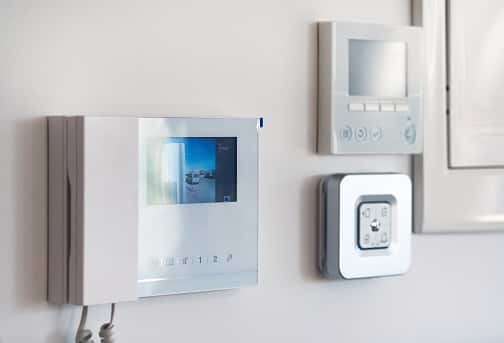Best wireless home security systems
Protect your home without the fuss

Home security systems don’t just alert authorities to a break-in. They can also deter intruders, help you watch your kids when they play outside and call for help when a grandparent falls. Wireless security systems can be installed quickly, and often you can do it yourself, which can save you an installation fee.
Our top picks for wireless home security systems:
- Our pick for home automation: Vivint Smart Home
- Our pick for ease of use: ADT
- Our pick for flexible contracts: Link Interactive
- Our pick for easy installation: SimpliSafe
- Our pick for wireless cameras: Ring
Our picks
To choose our picks, we looked at 27 home security companies, comparing 30 features, including availability, installation, monitoring options and cost. We also looked at customer reviews and ratings on ConsumerAffairs, performed hands-on testing and consulted security experts. All prices are accurate as of publishing.
- Smart Sentry feature
- Contract or month-to-month options
- Professional installation
Vivint offers professionally installed wireless security systems with the option of financing or month-to-month service to avoid a long-term contract. Vivint’s home automation options include full security systems, smart locks, cameras, thermostats and other connected devices that can be controlled and monitored through an app. These can work alongside other smart devices like Philips Hue, Kwikset smart locks, Alexa and Google Home.
What we like
Habas continued: “My second-favorite Vivint feature isn't nearly as exciting, but it's a small detail that other companies don't necessarily offer: guest logins for the Vivint app. You can let other people use key features in the Vivint app without giving them your personal login information.”
What reviewers say
- Easy-to-use equipment
- Six-month money-back guarantee
- Professional installation
ADT wireless security systems are professionally installed and require a 36- to 60-month contract. Like Vivint, ADT’s equipment selection includes security systems, cameras, smart locks, thermostats and other connected devices that can be controlled and monitored using the ADT app.
What we like
What reviewers say
- Tamper-proof technology
- Affordable equipment
- DIY installation
Link Interactive offers the flexibility of one-, two- and three-year contracts. The company also offers affordable equipment and DIY installation.
What we like
What reviewers say
“We looked at Vivint and what that would cost, and then looked at [Link Interactive] and decided that it was a better way to go. I … told them what equipment I wanted," John of Nebraska said. "They ordered it and I received it about seven days later, as promised. I set it up myself. There were instructions in the box on what to do and when to do what. I like what I got. It's a two- or three-panel and I also have the recessed door sensors, which are nice. Then the camera is good out front.”
- Easy to use
- Affordable equipment
- DIY installation
SimpliSafe offers a wireless system you can install yourself. Even better: You don’t need any tools or to put any holes in the walls. This makes it ideal for renters or those that just don’t want to fuss with a more permanent security system.
What we like
What reviewers say
- Large equipment selection
- Affordable equipment
- DIY installation
Ring has one of the largest equipment selections out of all the home security companies on our list. If you want a security system that’s camera-heavy, Ring is an ideal choice. It has a wide range of camera options, including solar-powered and floodlight cameras.
What we like
What reviewers say
How wireless security systems work
When wireless security sensors or cameras detect any unusual activity, they transmit the information to the control panel, which acts as the central hub of the system. Once the control panel analyzes the information, it triggers the appropriate response (e.g., sounding an alarm or notifying the authorities).
“Virtually all home security systems these days are (or can be) wireless because they communicate with the control panel, the monitoring center and your smartphone with wireless technology (Wi-Fi, 4G LTE, etc.) as opposed to an Ethernet cable or a phone line.”
How the devices communicate is what determines if the system is wireless or not. “Virtually all home security systems these days are (or can be) wireless because they communicate with the control panel, the monitoring center and your smartphone with wireless technology (Wi-Fi, 4G LTE, etc.) as opposed to an Ethernet cable or a phone line,” Habas explained.
Some security systems also rely on battery or solar-powered equipment, making them "wireless" in this regard, meaning the equipment isn't hard-wired into your home's electrical panel. When a company refers to its system as “wireless,” though, it typically means the devices communicate without a wired connection.
Pros and cons of wireless security systems
One of the primary benefits of wireless security systems is installation is faster and more flexible because there are no wires involved. Often, systems can be installed in as little as an hour, whether or not they’re installed professionally. Another benefit is you can easily expand the system as your security needs evolve without drilling holes or fiddling with your home’s electricity.
Pros
- Easy to install
- Easy to expand
- Reliable in a power outage
Cons
- Vulnerable to hacking
- Possible unstable connections
» LEARN: Security system installation: DIY vs. professional
Most wireless devices run on batteries, so you can also rest assured they’ll still work in a power outage. (Even systems that need to be plugged into an outlet typically have battery backups in case of emergency.)
Always being connected to the internet, though, can lead to vulnerability — hackers may figure out how to access your system through your Wi-Fi. To ensure the security of your wireless system, use best practices: Choose strong passwords, regularly update firmware, and utilize encryption to protect your data. Also, it's crucial to select a reliable provider that can offer guidance and support to ensure your system is secure and dependable.
Another drawback is that because many wireless devices use Wi-Fi, they’re prone to instability. Other devices using Wi-Fi (like your phone) can disrupt your security system’s connection. This can make security camera footage, for example, jumpy or pixelated.
Wireless vs. wired home security systems
One of the first decisions you need to make in choosing a home security system is whether to go with a wired or wireless system. Both have their pros and cons.
Wired systems can be more reliable in terms of internet connection, but they are more vulnerable to physical tampering. Wireless systems are more susceptible to hacking, though.
Wireless systems are popular because they're easy to install and can be set up quickly without any professional assistance. This can be a huge selling point for people who want a security system without the hassle of running wires and drilling holes in their walls. Plus, wireless systems are often more customizable and versatile, and you can add or remove components as needed.
Wired systems can offer a more stable and reliable connection because they're not affected by interference from other wireless devices. They can also be a better choice for larger homes or businesses; they can cover more area without losing signal strength.
Wired systems can be more difficult to install, though, because they require running wires throughout your home or business. This can be a major inconvenience, especially if you're not handy or don't want to deal with the mess and expense of wiring.
Another consideration is system security. While wireless systems are harder to disable physically, they can be more vulnerable to hacking and outside attacks. Wired systems, on the other hand, are less susceptible to hacking, but an intruder can disable the system by cutting wires.
You’re signed up
We’ll start sending you the news you need delivered straight to you. We value your privacy. Unsubscribe easily.








